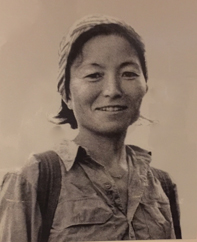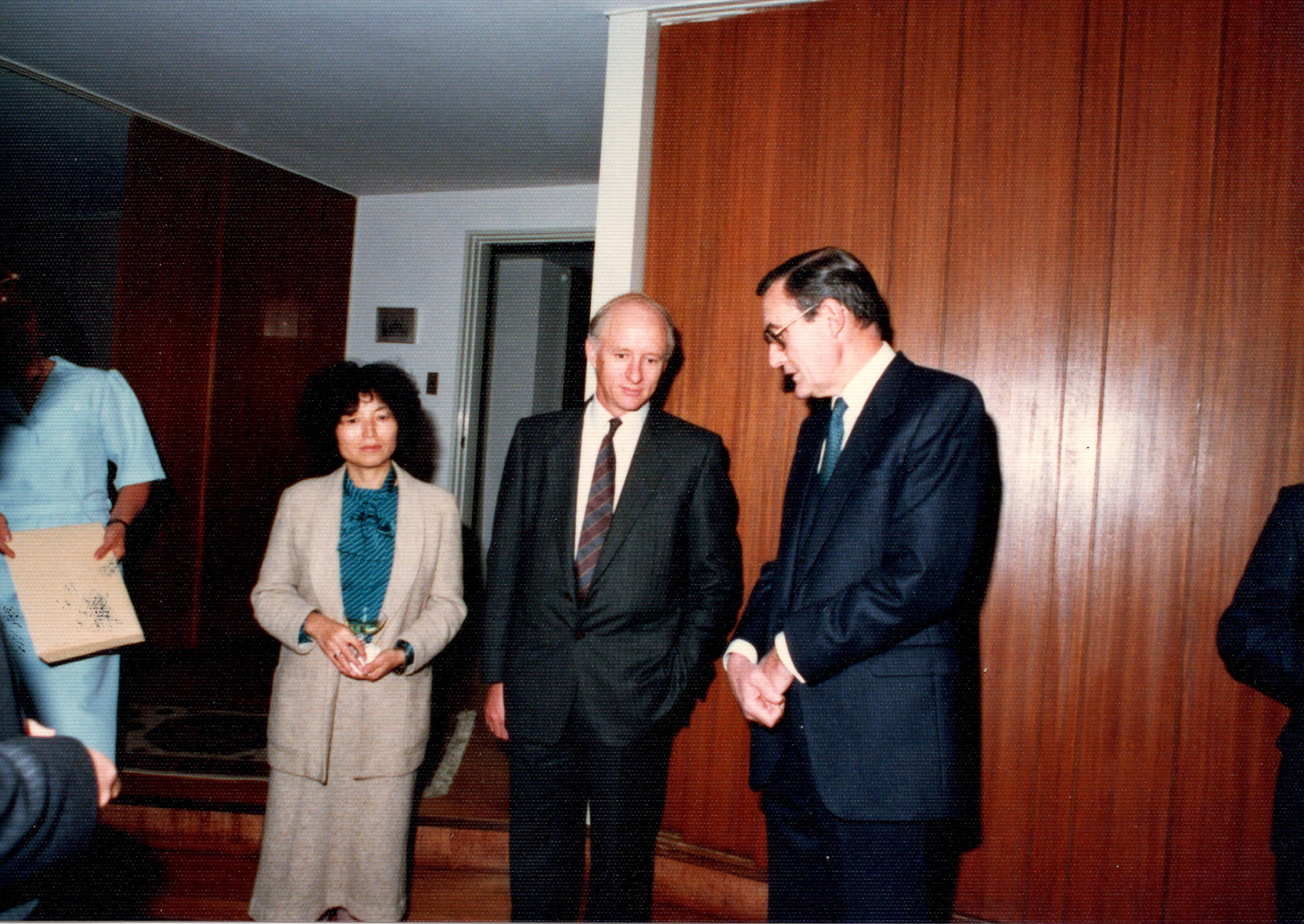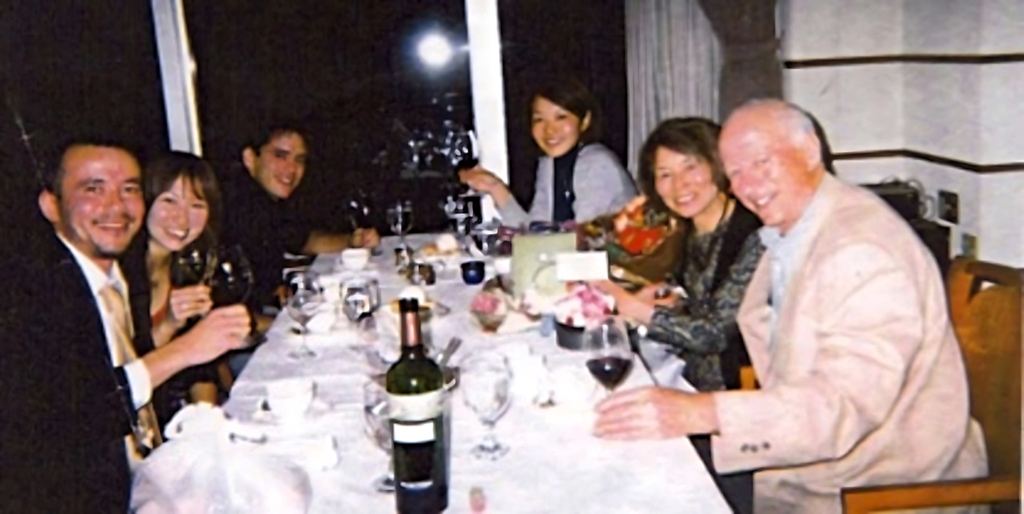Yasuko
We came together naturally.
I was in Japan, trying to make a mid-life career change. She was working at the Institute library where I researched.
In the queue for the Institute lunch hall she stood out for some reason. Calm, well built, intelligent…

I got to talk to her. She said she liked swimming. I suggested we go to a local pool after work. After the pool it was yakitori, often in nearby Shibuya…
She had studied English at university and wanted to learn more. But she went out of her way to help me with my struggling Japanese. It was typical of her generosity – unstinting and uncalculating.
From pool trips we moved to one day trips to the hills and mountains surrounding Tokyo. Then overnight stays in the huts on the higher peaks of Okutama and Chichibu. Eventually we found ourselves challenging the little known 3,000 meter ranges of the Southern Alps, just the other side of Mt. Fuji.
Some of those climbs were rough, dangerous even. But she never complained. She came from a postwar generation (and a part of Japan – Tohoku, the north of Honshu) which had learned to accept difficulty. From university she had passed the public service exams for entry to the government-sponsored Asia Research Institute (Aji-ken, now Institute of Developing Economies). Her father was a former coal mine employee who as the industry declined had turned himself into a teacher of the grammar-focussed English found in most high schools in those days. Together with his tradition-oriented wife they had carved out a reasonably middle-class living for their four daughters.
Gradually she came to share my liking for those weekend mountain adventures. She taught me the Japanese expression ‘yowane hakani (don’t whimper when facing difficulty).
My year of Aji-ken research over, I had to return to Australia, write up my thesis, find a job. Would I return to Japan? Maybe. But it had only been a one year involvement and I had only scratched the surface of the language and culture. I had a close friendship in Canberra. And if I was to work abroad, something closer to my former China or Russia involvements seemed to make more sense. And over China I had an attractive Hong Kong-based offer.
But Yasuko did something wonderful to keep me thinking about Japan, and her. A national radio program I had liked and used much for learning Japanese was Watashi-tachi no Kotoba – the reading out of letters from citizens, mostly elderly, giving their views on various life problems. Weekly Yasuko would tape the program and send it to me with a charming little letter (in Japanese).
When it came for me to decide my next move I chose Japan.
After the two years away she had not changed. She would visit me on weekends in the hanare (detached house) I was renting in the garden of a central Tokyo residence. Later it seemed natural that she should move from her place in the suburbs to the comfortable Waseda-district condo provided by my employers. Her progressive views said marriage was a feudal hangover. That matched my views. When our first son, Dan, arrived we invited all our friends to the traditional Japanese ‘first eating’ party where the child is given a ritual first tasting of fish and sake. For us it was a way much more natural than wedding ceremonies to tell the world we were together. We also saw it as natural that the child should have her surname, Tanno, and nationality.
In 1975 I returned to Canberra to work in the government. Yasuko got a good job for herself in the Japanese section of the National University Library there. A year later the government collapsed and we were back in Japan. I had only the vague offer of some work at Sophia University. But fortunately Yasuko could go back to Aji-ken and we remained afloat financially. We got ourselves a small apartment in the Yotsuya area and I set about finishing the manuscript of the book about Japan that I had been asked to write two years earlier.
Thanks to the Japanese curiosity about how we foreigners saw them that book was to propel me into a very new world of university tenure, unending media exposure, and the extraordinary Japanese lecture circuit that can take you from one end of Japan and back in a single day, with stops in between. Before long we could afford to buy an old house with a small garden in the Ichigaya area nearby.
By this time our second son, Ron, had arrived. My various new involvements meant I could only partly help Yasuko with the burden of raising two young children while holding down the Aji-ken job. She never complained. We also set about trying to raise the children bilingually. My English was ‘Daddy talking.’ Her Japanese was ‘Mummy talking.’
Two children meant we could not continue our mountain climbing adventures so we decided we would find our own ‘mountain’ – a patch of jungle hillside in the middle of the Boso peninsula just to the south of Tokyo. It was totally primitive, with water only from a stream far below, no road access, no electricity, nothing except views of yama mata yama (hills after hills). But it was also totally ours, without the slightest sign of other human existence in any direction. Most Japanese women would run a mile to avoid such a wild and isolated place. But Yasuko loved it, even more than I did.
Later we moved to some better located, abandoned farm land, where we could build a proper house and begin to grow things. She shared in part my enthusiasm for this crude farming adventure. She enjoyed especially collecting sansai – edible plants growing in the wild. The one thing we did share, in full, was a deep hatred for militarism and the people who promoted it.
At Aji-ken her research field was education in Africa. This required her to spend a year in Nairobi, and then another year in the UK where she organised boarding schools for the children. It was the ideal age (about ten years) to cement their English. Back in Japan we could put them through the higher levels of the Japanese education system without their losing identity or their English.
She loved to read. Almost every week she would come up with Japanese articles and references to help my work. Later I was to discover her extraordinary ability at English-Japanese translation. Her sentences were clear and simple; some would say her translations read better than my originals. Her other talent was for painting – charming sketches of old buildings and temples, flowers and forest scenes.
She lived very simply too, often staying in an old house we bought on the Boso coast in Amatsu, near Kamogawa where she soon found a circle of friends. People came to like her for that simplicity and her honest charm. Her wardrobe could have fit into a large suitcase. Yet somehow when we went to an official party or gathering she would seem as elegant as anyone else in the room.

She loved cats, and often felt obliged to stay in the Amatsu house rather than return to Tokyo, simply so that Benben, a 22 year old veteran born into our family, could live out his days.
The end came slowly. A fainting fit had caused a bad fall in the Amatsu house. Although injured she waited a day and night without contacting anyone before going to a local clinic where they diagnosed pneumonia. For all the next night we sat tense at her bedside as she struggled in the nearby Kameda hospital to recover breathing. Then we got the really bad news: A blood test revealed she had leukemia.
It is a dreadful disease. Your blood sets out to kill you while constantly holding out hope that another blood transfusion might reverse things.
I blamed myself for not being in the house when she fell. But in the months that followed and the blood transfusions gradually increased she would say stoically that without that fall they would not have discovered her illness at an early stage.
Sadly, acute leukemia even at an early stage offers no cure. Eventually we had to place her the National Cancer Hospital in Tsukiji just the other side of Ginza. The care was wonderful but it could not stop the gradual wasting away of her already frail body. At the last stage blood begins to leak into the brain. In the hours by her bedside we would try to help her hold consciousness by going back over past events and getting her to sing songs with us. On the night before she died her weak voice joined us in that beautifully lingering Misora Hibari song ‘- Kawa no nagare no yohni (川の流れのように) – as the river flows..) For the first time in my life I discovered what it is to suffer uncontrollable grief.
I discovered it again at the wake oganised by my two sons and their wives, Yumiko and Ran. Together with the photo of the Yasuko I will always love they played that song again. ‘As the river flows, unknowing and unknowingly, walking the long, narrow road …..’

January 2015, New Year Tanno-Clark family get-together at the FCCJ. From left: Son Dan, wife Yumiko. Son Ron, wife Ran.Yasuko, myself.
Messages:
This is a message from artist friend Jun Matsuoka:
I have many cherished memories of Yasuko-san, and will always remember her open heart and sincerity. We exchanged postcards, and when she wrote to me, there were sketches of the ocean, the snow, Amatsu sky…I will treasure them with memories.
From my sister, Cecily: She was a beautiful lady in so many ways and you must have many wonderful memories to cherish. Even though I only met her twice she made a lasting impression on me!
Yasuko(靖子)さんとの「文通」 Yoichi Teraishi (寺石容一)
September 11, 2017
Yasuko さんとはおもに「文通を通じての交際」がメーンでした。
ずいぶん前にGregory さんに彼女をご紹介されて以来、数度お会いしてお話をしたこともありました。とても気品にあふれたチャーミングな女性で、きさくな方でした。わたしも家内もいまでも、そしてこれからもずっと彼女のファンです。
私は、ふだん、お会いするチャンスがなくても、たまの手紙による「文通という手段」により、お互いの生活のことについて交流を保ち続けました。これがとてもよかったような気がします。お互いが好きなことを書けたからです。
私たちの文通は「ネコ」に関するものがほとんどでした。わたしたちは東京の家でネコを数匹飼っており、Yasukoさんも一匹でしたか、お飼いになられていたようでして、ネコに関する話題は尽きませんでした。お互いにネコはお互いの家族同然だったのです。
こうして文通を交わしていくほどに私はYasukoさんが旦那様のGregory さん、そしてお二人の息子さんを心から愛しているということに気が付きました。彼女はとても優しい妻であり母親であることがわかったのです。ステキなことでした。
昔ながらの手紙という意思疎通、コミュニケーションの手段は不思議な温かみを感じました。Yasukoさんはあちこちを歩いて旅をするものが好きなようで、好奇心にあふれた方だったような気がします。無邪気で、博学で、ユーモアたっぷりで・・・・。
夢でしょうが、いつの日か天国の彼女からの手紙が届くのではと感じております。
Our way of communication was mainly through letters.
Since dear Gregory introduced Yasuko san to me and my wife Keiko, we had several occasions to talk together. We were so impressed to find that she was such a graceful, charming and open-hearted lady. We are her fans now and will be so forever.
Though we did not have many chances of meeting, we could maintain the means of communication through letters. We could tell about our life to each other through letters. We could write whatever we liked to tell.
The main subject of writings was almost about out CATS. We were taking care of several cats in our house in Tokyo and Yasuko san was taking care of her own. We wrote a lot about them. Our cats were members of our family.
I found in her letters that Yasuko san loves Gregory, her husband and two sons from the bottom of her heart. I found that she was such a kind wife and mother. It was such a marvelous finding.
The letters, the old conventional way of communication, made me feel very warm. I feel that Yasuko san liked travelling here and there. I feel that she was full of curiosity. Such a simple-minded, innocent, full of knowledge and sense of humor………person, she is.
I feel some day her letter will be sent to us from her in the heaven.
—————————————————————————————
From John Wocher, Kameda Hospital:
True friend, Deeply missed
Down-to-earth as earth itself.
Authenticity
Asking nothing, giving all
Rest in Peace, not forgotten
With perpetual condolences.